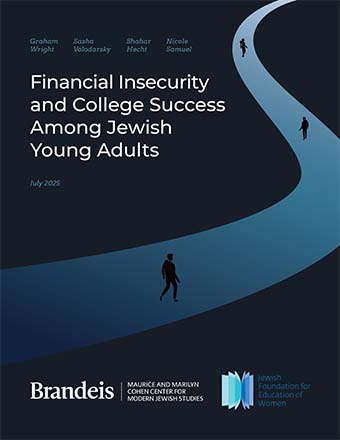Financial Insecurity and College Success Among Jewish Young Adults
Graham Wright, Sasha Volodarsky, Shahar Hecht, and Nicole Samuel

July 2025
This report explores the impact of financial insecurity on the college trajectory of Jewish young adults. The findings are based on survey data collected in spring 2024, from 2,164 Jewish respondents, and from 19 in-depth follow-up interviews conducted in spring 2025. All respondents were ages 23-24 at the time of data collection.
The report examines how those who grew up with the most financial need (16% of all respondents) compared to their peers who grew up in more affluent circumstances with respect to their journey from high school to college and beyond.
Read related opinion piece by Rona Sheramy and Graham Wright: Piercing the solitude of the financially insecure Jewish college student
Key Findings
- For most Jewish students, financial insecurity is not a barrier to attending and even to graduating from college. Attending college was treated as “a given” and Jewish young adults who grew up in families that struggled financially found a way to achieve this “non-negotiable” goal.
- Financial insecurity only had a small impact on where young Jews attend college. Respondents who grew up in situations of financial insecurity were more likely to prioritize cost, and their parents often encouraged them to attend more affordable schools.
- Financial insecurity had a big impact on how these young Jews paid for school. Over 40% of those from financially insecure families were solely responsible for all costs associated with college, and over 20% reported that they were responsible for over $20,000 of student loan debt.
- Financial insecurity adversely impacts the quality of young Jews’ college experiences. Students from more financially insecure backgrounds were less likely to be aware of internship opportunities and more likely to need to balance their educational goals with employment, limiting their participation in extracurricular activities.
- Those from more financially insecure households were more likely to report further financial insecurity in college. Although serious financial hardship was rare among these respondents, a quarter of those from the most financially insecure households reported experiencing intense food insecurity during their time at college, and 6% reported a period of homelessness. Over half of those from financially insecure backgrounds reported that financial stress adversely impacted their day-to-day life to some extent.
- Financial insecurity during high school was also associated with lower academic achievement in college. These students’ academic challenges during college were often a result of them being less prepared for college, in addition to their higher levels of financial stress during college.
- While almost all of those from more financially secure families received a BA, fewer than 80% of those from financially insecure families had done so by age 24.
- A year or so after they finished college, only a third of those Jewish students from the most financially insecure households were currently in a job they considered a career, compared to 40% of those from more financially secure households.